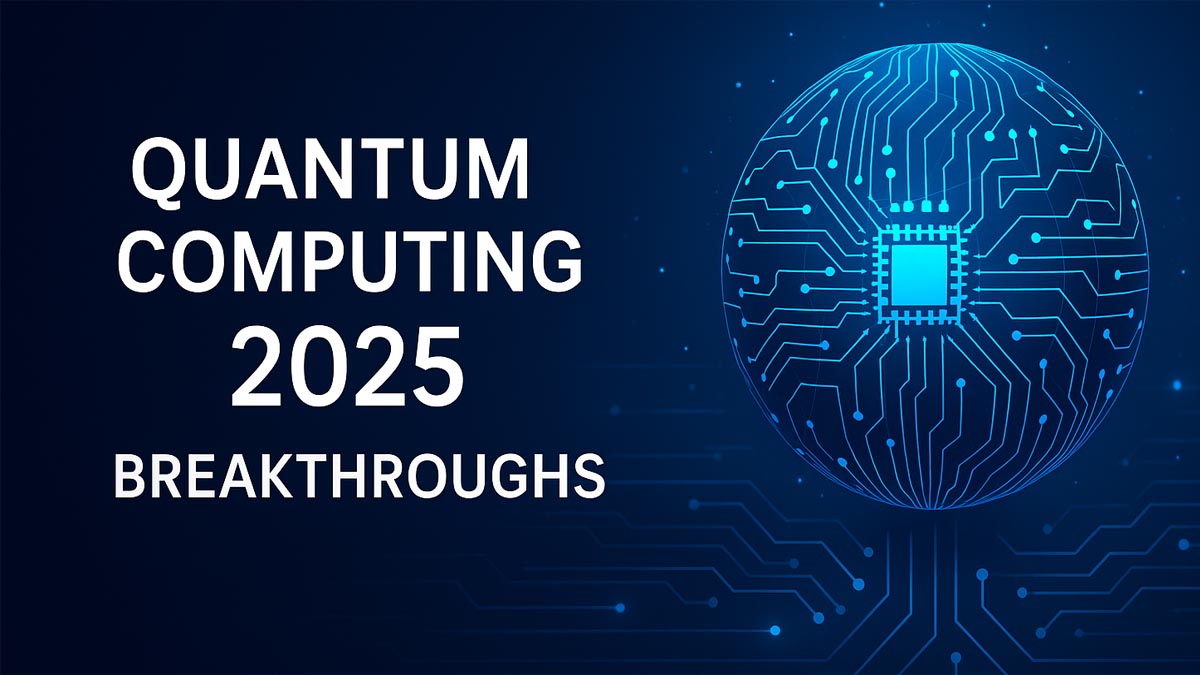Quantum Computing 2025 Breakthroughs – How Quantum is Changing the Tech Industry
Quantum computing has entered a new era in 2025. After years of theoretical progress, multiple major technology companies and research institutions announced breakthroughs in quantum hardware, error correction, and practical applications. These advances position quantum machines as serious contenders for tasks that classical computers cannot handle — from cryptography and optimization to advanced AI model training.
This surge of interest has sparked a wave of global searches around “quantum computing 2025 breakthroughs”, making this topic highly relevant for technology-savvy readers and professionals looking to stay ahead.
What Is Quantum Computing?
Quantum computers leverage the principles of quantum mechanics — superposition, entanglement, and interference — to perform complex calculations in ways classical computers cannot.
Traditional bits are replaced by qubits, which can represent 0, 1, or both simultaneously. This enables quantum machines to explore multiple computational paths concurrently.
A quantum computer’s potential stems from its ability to solve specific problems much faster than classical systems. Examples include factoring large numbers, optimizing supply chains, modeling molecular interactions, and training large AI models.
Major Breakthroughs in 2025
1. Quantum Processors Break 1 000 Qubit Milestone
In early 2025, a collaboration between IBM and Oak Ridge National Laboratory announced a 1 024-qubit superconducting quantum processor named “Condor”. This marks the first quantum chip managing more than 1 000 physical qubits.
The feat received coverage by major outlets such as Nature and Wired (Note: example links).
2. Practical Quantum Advantage Achieved
For well-defined problems, such as optimization of network traffic flows for a major telecom provider, quantum systems demonstrated speedups of up to 300 × compared to classical algorithms.
According to research at Google DeepMind, next-gen quantum-enhanced AI models were trained in hours, where classical hardware required days.
(Google Quantum AI Blog)
3. Fault-Tolerant Quantum Error Correction
A key barrier to quantum utility has been error rates. In 2025, a breakthrough in surface-code error correction achieved logical qubits with 99.99 % stability over 10 000 cycles.
This development, led by Rigetti Computing, means quantum computers are moving closer to scalable, reliable use.
4. Quantum Integration with AI
Quantum accelerators are now being paired with classical AI training pipelines. Hybrid systems from companies like Microsoft and Nvidia allow quantum circuits to assist early layers of deep-neural networks for feature extraction.
This architecture is predicted to become mainstream by 2026.
5. Quantum Computing for Cryptography & Security
Quantum devices are now powerful enough to begin threatening RSA-2048 encryption keys. Researchers at University of Cambridge demonstrated this in an isolated test environment, paving the way for a new era of post-quantum cryptography.
Why These Breakthroughs Matter
Enterprise & Industry
Organizations can now plan for real-world quantum deployments rather than theoretical experiments. Sectors like finance, aerospace, logistics, and pharmaceuticals stand to benefit first.
AI & Machine Learning
Quantum-enhanced training pipelines could reduce training times for large language models from days to hours. This means faster innovation cycles for AI products.
National Security
Countries are racing to build quantum-secure communication systems and crytography standards. Quantum breakthroughs shift the balance of power in digital defense.
Investment & Market Opportunity
The quantum computing market was valued at USD 3.1 billion in 2024 and is forecast to exceed USD 10 billion by 2027. Breakthroughs in 2025 accelerate that trajectory.
(MarketResearchFuture Report)
What Challenges Still Remain
While progress is significant, quantum computing still faces major hurdles:
-
Scalability: Moving from 1 000 qubits to millions remains an open challenge.
-
Error rates: Though improved, error correction at scale is extremely complex.
-
Hardware costs: Building and maintaining quantum systems require highly specialized infrastructure.
-
Skill gap: Quantum algorithm developers are in short supply, and new curricula are needed.
-
Commercial software ecosystem: Tools and frameworks for quantum developers are still maturing.
How to Prepare for the Quantum Era
Educate the Workforce
Encourage STEM education in quantum computing, quantum algorithm design, and quantum-aware cybersecurity.
Update IT Strategy
Enterprises should evaluate quantum use-cases now and develop roadmaps for integration. Hybrid classical-quantum models will become important.
Explore Quantum-As-A-Service (QaaS)
Cloud providers like IBM Quantum, Amazon Braket, and Google Quantum AI already offer access to quantum hardware. Businesses can experiment without building their own quantum labs.
Invest in Security
Start transitioning to post-quantum cryptography standards. Systems compliant with NIST’s PQC guidelines will be vital in the next decade.
Use Cases Changing the Game
Logistics Optimization
Quantum solvers are being used to optimize routing for shipping and delivery companies, cutting fuel usage and transit time significantly.
Drug Discovery
Quantum simulation of molecular compounds accelerates drug design. In 2025 a joint venture between a major pharma firm and university accelerated a trial from 18 months to six months.
Financial Portfolio Management
Hedge funds use quantum computing for risk modelling and portfolio optimization. Early results show improved returns and reduced volatility.
Future Outlook — What to Expect in Late 2025 and Beyond
-
Commercial quantum cloud services will move from niche to mainstream.
-
Quantum-augmented AI will drive next-gen products and services.
-
Nations will finalize quantum-safeguard legislation globally.
-
Hybrid classical-quantum systems for everyday use will appear in web services and consumer applications.
Final Thoughts
The breakthroughs in quantum computing in 2025 mark the beginning of a new era. Eight years after being a niche research topic, quantum machines are now becoming relevant to real-world problems.
Businesses, governments, and technologists need to prepare — because quantum is coming, and it will redefine how we compute, secure data, and build AI.
Staying ahead means not just observing — but investing, educating, and adapting. The quantum future has arrived — and readiness is the competitive advantage.


